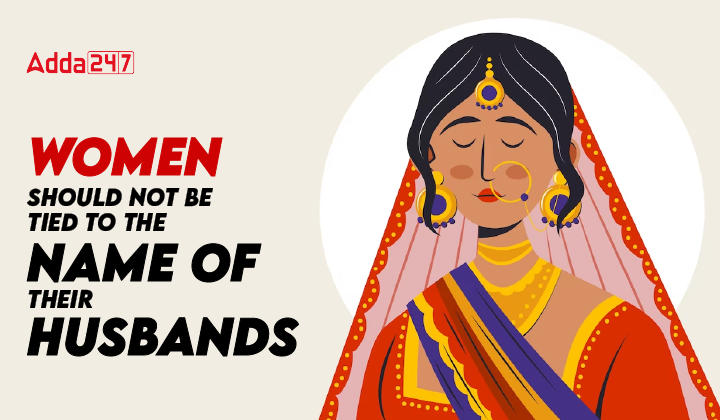Table of Contents
Context- Ms. Divya Modi Tongya petitioned the Delhi High Court for permission to revert to her maiden name following the finalization of her divorce.
Relevance- GS Paper II Social Issues, Gender empowerment, Equality.
What hinders the Married woman from keeping her Maiden Surname?
- Per the government notification, a divorced woman wishing to use her maiden name must provide either her divorce documents or a no-objection certificate from her husband.
- The notification is deemed “gender-biased” as it imposes undue constraints on women who wish to assert their constitutional right to select their name, as in Divya’s scenario, specifically their surname, thereby infringing upon Articles 14, 19, and 21.
- Articles 14, 19, and 21 are said to be the golden triangle of the Indian Constitution.
Issue of Gender Empowerment
- If a woman, after marriage, does not want to opt for her husband’s surname, she has to face unnecessary restrictions.
- For instance: she has to furnish a lot of papers if she visits a bank account, passport office, and for children’s admission.
- In a society that is already biased towards women, such notifications are adding to the already burdened women.
- India is known for stark gender disparities both political and social.
- According to the United Nations, the most significant human rights issue currently facing the world is attaining gender equality and empowering women and girls.
Steps Taken by Government for Gender Empowerment
- Constitutional Provisions: The Constitution of India enshrines equality for all citizens, including gender equality, through various articles such as Article 14 (Equality before Law) and Article 15 (Prohibition of discrimination on grounds of religion, race, caste, sex, or place of birth).
- Legislative Measures: The government has enacted various laws to protect and promote women’s rights, such as the Protection of Women from Domestic Violence Act (2005), the Sexual Harassment of Women at Workplace (Prevention, Prohibition and Redressal) Act (2013), and the Prohibition of Child Marriage Act (2006).
- National Policy for Women: The National Policy for Women was introduced to guide all sectors of the government in integrating women’s perspectives in all developmental processes, with revised versions to reflect changing societal norms and women’s needs.
- Reservation Policies: The Constitution (106th Amendment) Act, 2023, reserves one-third of all seats for women in Lok Sabha, State legislative assemblies, and the Legislative Assembly of the National Capital Territory of Delhi, including those reserved for SCs and STs
- Gender Budgeting: The government has adopted gender budgeting as a tool to ensure that the allocation of resources is gender-sensitive and benefits women and girls, promoting gender equality in economic opportunities.
- Financial Inclusion: Schemes like the Pradhan Mantri Jan-Dhan Yojana aim at financial inclusion, with a significant focus on opening bank accounts for women, ensuring their financial independence and security.
- Maternity Benefit Amendment Act (2017): This act increased paid maternity leave from 12 weeks to 26 weeks, one of the most progressive maternity leave policies globally, encouraging women to remain in the workforce even after childbirth.
Ground Reality of Gender Empowerment
- Findings of, The Sustainable Development Goals Report 2023: (The world is not on track to achieve gender equality)
- At the current rate, it will take
- 300 years to end child marriage
- 286 years to close gaps in legal protection and remove discriminatory laws
- 140 years to achieve equal representation in leadership in the workplace
- Nearly half of married women lack decision-making power over reproductive health and rights
- One in five young women are married before their 18th
- Insufficient Focus on Intersectionality: Policies often do not adequately address the compounded discrimination faced by women due to caste, religion, ethnicity, or socioeconomic status, ignoring the nuanced realities of intersectional identity in India.
- Urban-Rural Divide: A significant portion of gender equality initiatives tends to be urban-centric, not fully reaching or addressing the unique challenges faced by women in rural areas, where traditional gender roles are more deeply entrenched.
- Political Representation: Even with reservation policies in place, women’s representation in political offices remains low. This reflects a need for more robust measures to encourage and support women’s participation in politics. Ex- reservation in local governments was provided to women back in 1993, but on the ground, these elected women decided on the advice of their husbands known as “sarpanchpati”.
Conclusion
- Merely professing belief in women’s equality without enacting substantial changes through legislation and robust social support structures undermines the objective.
- Although Legislative Gender quotas are effective in achieving equality in Politics. For Instance- women’s representation in parliament: countries applying quotas, 30.9%, and countries without quotas 21.2%.



 TSPSC Group 1 Question Paper 2024, Downl...
TSPSC Group 1 Question Paper 2024, Downl...
 TSPSC Group 1 Answer key 2024 Out, Downl...
TSPSC Group 1 Answer key 2024 Out, Downl...
 UPSC Prelims 2024 Question Paper, Downlo...
UPSC Prelims 2024 Question Paper, Downlo...







